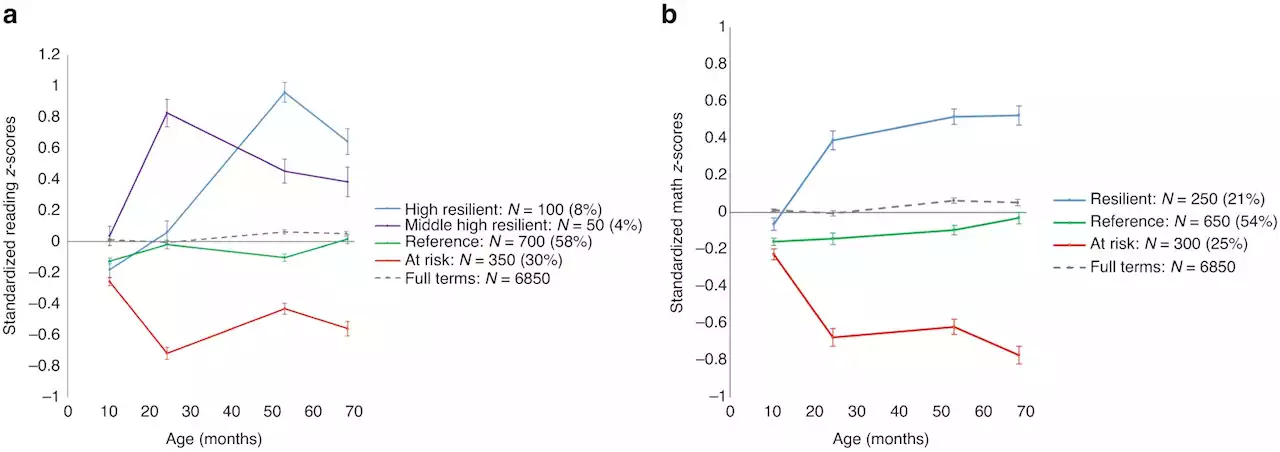Infants who spent most of their first year in the pandemic have fewer types of bacteria in their gut than infants born earlier, according to a team of developmental psychology researchers.
The findings, published in Scientific Reports, showed that infants whose gut microbes were sampled during the pandemic had lower alpha diversity of the gut microbiome, meaning that there were fewer species of bacteria in the gut. The infants had a lower abundance of Pasteurellaceae and Haemophilus-;bacteria that live within humans and can cause various infections-;and significantly different beta diversity, which tells us how similar or dissimilar the gut microbiome for two groups may be.
The COVID-19 pandemic provides a rare natural experiment to help us better understand how the social environment shapes the infant gut microbiome, and this study contributes to a growing field of research about how changes to an infant's social environment might be associated with changes to the gut microbiome."
For their study, the authors compared stool samples of two socioeconomically and racially diverse group of 12-month-olds living in New York City that were provided before the pandemic and between March and December of 2020 .
Danmark Seneste Nyt, Danmark Overskrifter
Similar News:Du kan også læse nyheder, der ligner denne, som vi har indsamlet fra andre nyhedskilder.
 Pandemic may have changed the gut bacteria of infants, research findsInfants who spent most of their first year in the pandemic have fewer types of bacteria in their gut than infants born earlier, according to a team of developmental psychology researchers.
Pandemic may have changed the gut bacteria of infants, research findsInfants who spent most of their first year in the pandemic have fewer types of bacteria in their gut than infants born earlier, according to a team of developmental psychology researchers.
Læs mere »
 Sensitive parenting and preschool attendance may promote academic resilience in late preterm infantsLate preterm infants, or infants born 34 0/7 and 36 6/7 weeks of gestation, are the majority of infants born preterm, and are at greater risk for academic delays compared to full term infants.
Sensitive parenting and preschool attendance may promote academic resilience in late preterm infantsLate preterm infants, or infants born 34 0/7 and 36 6/7 weeks of gestation, are the majority of infants born preterm, and are at greater risk for academic delays compared to full term infants.
Læs mere »
 Gestational weight gain increased in Louisiana during the pandemic, reports researchLouisiana women who gave birth during the COVID-19 pandemic were 3% to 7% more likely to exceed the recommended weight gain levels than those who gave birth prior to the pandemic. Research from Pennington Biomedical Research Center and Woman's Hospital in Baton Rouge showed that instances of non-optimal gestational weight gain, or GWG, were seen in more than 45% of pregnant women during the peak of the pandemic, whereas only 42% experienced non-optimal gain in the year preceding the pandemic.
Gestational weight gain increased in Louisiana during the pandemic, reports researchLouisiana women who gave birth during the COVID-19 pandemic were 3% to 7% more likely to exceed the recommended weight gain levels than those who gave birth prior to the pandemic. Research from Pennington Biomedical Research Center and Woman's Hospital in Baton Rouge showed that instances of non-optimal gestational weight gain, or GWG, were seen in more than 45% of pregnant women during the peak of the pandemic, whereas only 42% experienced non-optimal gain in the year preceding the pandemic.
Læs mere »
 Assessing the effects of the COVID-19 pandemic on cancer preventionA review of the international effects of the COVID-19 pandemic on cancer prevention, led by researchers at Queen Mary University of London, found that prevention services were severely affected in the early months, and in some places are still recovering.
Assessing the effects of the COVID-19 pandemic on cancer preventionA review of the international effects of the COVID-19 pandemic on cancer prevention, led by researchers at Queen Mary University of London, found that prevention services were severely affected in the early months, and in some places are still recovering.
Læs mere »
 Shipping Woes Ease As Rates Drop To Pre-Pandemic LevelsGlobal freight rates have recently seen a decline, sparking hope among buyers, even as shipping lines continue to grapple with issues like overcapacity and below-cost rates.
Shipping Woes Ease As Rates Drop To Pre-Pandemic LevelsGlobal freight rates have recently seen a decline, sparking hope among buyers, even as shipping lines continue to grapple with issues like overcapacity and below-cost rates.
Læs mere »
 Nearly half of phones tested during pandemic carried COVID-19 virus, finds systematic reviewAlmost half of mobile phones tested at the height of the pandemic were contaminated with the SARS-CoV-2 virus, bolstering a theory that the devices supercharged the spread of COVID-19.
Nearly half of phones tested during pandemic carried COVID-19 virus, finds systematic reviewAlmost half of mobile phones tested at the height of the pandemic were contaminated with the SARS-CoV-2 virus, bolstering a theory that the devices supercharged the spread of COVID-19.
Læs mere »
